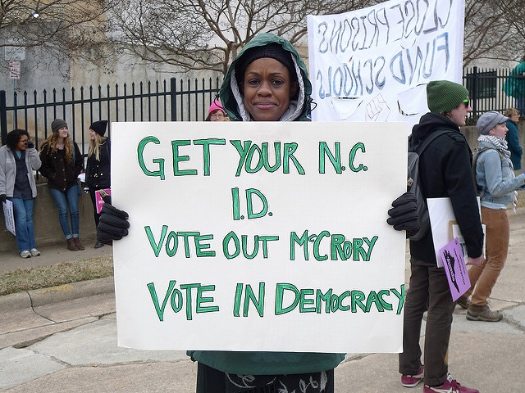
May 15, 2017; Washington Post and AP via Milwaukee Journal-Sentinel
Last week, Trump signed an executive order to investigate his own unsupported claims of widespread voter fraud, as covered by NPQ. Readers will recall that in 2013 the Supreme Court struck down a key section of the Voting Rights Act that “effectively removed federal oversight of states with a history of discrimination.” This sparked a wave of restrictive state measures that has challenged the indefatigable voting rights movement with its persistence. But just yesterday, voting rights activists scored a victory in this battle when the Supreme Court announced that it “will not consider reinstating the 2013 North Carolina voting law that a lower court ruled discriminated against African American voters…with ‘surgical precision.’”
Though the Supreme Court does not have to give reason for its decision not to take a case, it noted the circumstances surrounding this one, particularly the Republican legislative leadership’s continued appeal attempts and the Democratic governor and attorney general decision to let it stand.
The 4th Circuit on July 29 agreed with allegations from the Justice Department and civil rights groups that North Carolina’s bill selectively chose voter-identification requirements, reduced the number of early-voting days and changed registration procedures in ways meant to harm African Americans, who overwhelmingly vote for the Democratic Party.
The appeals court did not allow the law to be used in the 2016 election, and voters replaced the state’s Republican governor, Pat McCrory, with Democrat Roy Cooper.
Cooper and the state’s new Democratic attorney general, Josh Stein, told the Supreme Court they did not want to appeal the lower court’s decision that the law violated the Constitution and the Voting Rights Act.
Civil rights groups celebrated. “This is a huge victory for voters and a massive blow to Republicans trying to restrict access to the ballot, especially in communities of color,” said Democratic National Committee Chairman Tom Perez.
The Post writes, “The battle against the North Carolina law, considered one of the nation’s most far-reaching, consumed years of litigation by the Obama administration and a wide coalition of civil rights organizations.”
North Carolina’s House Speaker Tim Moore and Senate leader Phil Berger, the state legislature’s top Republicans, vow to keep fighting. In a statement, they said, “North Carolinians can rest assured that Republican legislators will continue fighting to protect the integrity of our elections by implementing the commonsense requirement to show a photo ID when we vote.”
Wisconsin, however, did pass a voter ID law, and Trump’s executive order has reignited the debate there. The Associated Press reports,
Under the Wisconsin law, voters must present a driver’s license, state ID, passport, military ID, naturalization papers or tribal ID to vote. A student ID is acceptable only if it has a signature and a two-year expiration date. Those who do not have their ID can cast a provisional ballot that will be counted only if they return with the proper ID within a few days of the election.
Sign up for our free newsletters
Subscribe to NPQ's newsletters to have our top stories delivered directly to your inbox.
By signing up, you agree to our privacy policy and terms of use, and to receive messages from NPQ and our partners.
[…]
By one estimate, 300,000 eligible voters in the state lacked valid photo IDs heading into the election; it is unknown how many people did not vote because they didn’t have proper identification.
This could be a national problem.
A survey conducted by the Brennan Center in 2006 estimated that while as many as roughly 21 million voting-age U.S. citizens did not have valid government-issued, photo identification, an additional 4.5 million had a valid ID but one that did not have their current name or address.
Supporters of voter ID laws say that prohibiting out-of-state driver’s licenses reduced the possibility of voter fraud and individuals filling out multiple ballots. Research has shown that such voter fraud can happen, but it’s very rare.
Further, “The Brennan Center estimated that in the 10 states with voter ID laws in 2012, more than 10 million eligible voters lived more than 10 miles from a state ID-issuing office that is open more than two days a week.”
Looking past the debate to the results of these rulings, we see that Trump won both North Carolina and Wisconsin.
Overall, nearly 3 million people in Wisconsin voted last November, about 91,000 fewer than in 2012. Milwaukee, a power center for Democrats, reported that 41,000 fewer people voted there in 2012…Backers of the ID law say that it was a success.
[…]
A former U.S. senator from the state, Democrat Russ Feingold, called voter ID laws “scams” from Republicans who know “the Democratic Party has the numbers to decisively win every presidential election and a majority of Senate seats.”
The battle will surely wage on, and the issue is likely to return to the Supreme Court. Still, what we have seen so far, in the words of the Associated Press, is courts “upholding laws that are generally narrow in scope while striking down others considered too broad.”—Cyndi Suarez













